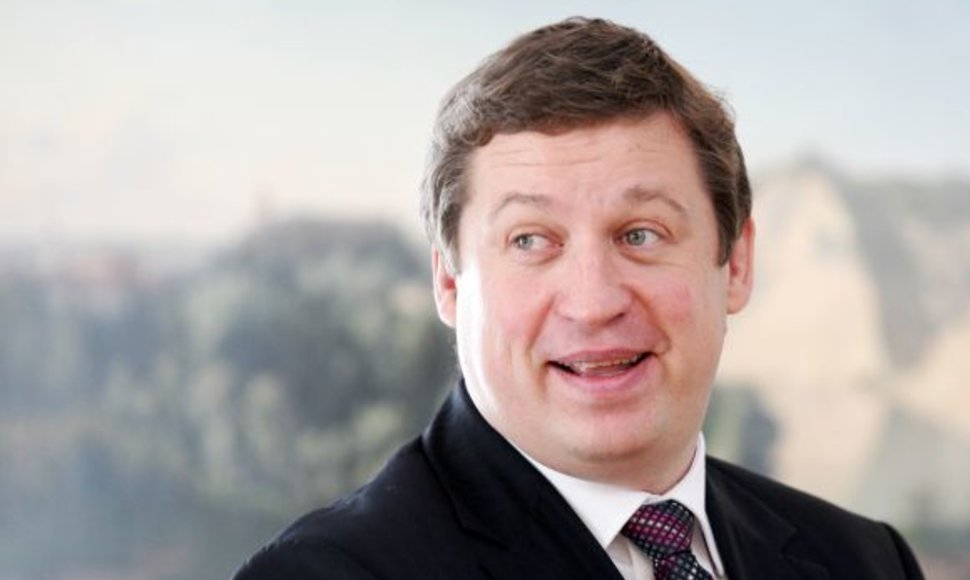Lithuania takes over the EU Council presidency at a complicated time: half a year remains until the next European Parliament elections; the term of the European Council is nearing its end, too; the euro zone is still struggling with the debt crisis. It still remains to be seen whether Ireland, the current presiding nation, will close an agreement on the EU's multi-annual financial perspective. The 960-million-euro budget, agreed on by EU state leaders, has yet to get a blessing of the European Parliament.
– 1 July is at our door, the grand opening of Lithuania's EU Council presidency. And what will happen afterwards?
– Presidency should be seen as a duty of every EU member state. We reek great benefits from our membership in the EU. Last but not least is the European money we get. But we must give as well as take – and this is our opportunity to do so.
The Council is one of the key institutions of the EU – one of the two bodies that pass laws, work with the budget, and makes EU policies.
The Council is one of the key institutions of the EU – one of the two bodies that pass laws, work with the budget, and makes EU policies. Lithuania's task will be to manage this process. In other words, to mediate in negotiations among 27 – and after Croatia joins in July, 28 – members, to represent the Council in talks with other institutions. These are functions pertaining to an honest negotiator and mediator.
Many events will be taking place in Lithuania, we will have to present ourselves in Brussels, but the presidency primarily has to do with very specific work in the Council.
We cannot expect to get an extra bag of cash just because we're presiding over the EU. That will not happen. We will be the ones who work for a solution and not push our agenda. There have been instances of such pushing, but they usually fail and only do harm to a country's image.
Sure, one can draw attention to certain specific issues, in our case it will be the Eastern Partnership, protection of EU external borders, energy. But that does not mean we will do everything. Once again – neutrality is key, working for the good of the entire EU, not just Lithuania.
– You work in Brussels and can probably see better from up close presidencies of other countries and, at the same time, predict how well we're going to perform. What do EU members states expect from Lithuania?
– Most countries do achieve results everyone expects from them. Our situation is exceptional in that Lithuania's will be the last full presidency before the EP elections. That means a lot of work.
Another illustration of what it involves – the multi-annual financial perspective and discussions thereof in the Council and the European Parliament. We hope that our Irish colleagues will crack this nut, but if not, the issue will be moved to September-October. Not a good thing, since it would push back other tasks, too. Lithuania will have to finish adopting documents to do with the financial perspective, with funds intended for cohesion, agriculture, fishing, infrastructure, science. We absolutely must tackle 56 pieces of legislation before the end of the year, as otherwise a legal vacuum would block funding for these programmes.
We absolutely must tackle 56 pieces of legislation before the end of the year, as otherwise a legal vacuum would block funding for certain programmes.
There are 19 more documents relating to them, but they would not halt funding, postpone it at most.
Another part of the package – the euro zone crisis, the need to stimulate growth. Most priorities have been outlined by the European Council. There are 45 of them – including banking union, financial services rules, integration of the internal market, etc.
Unless we take on at least some of these issues and do everything to get them solved, others will not understand us. On top of these, there is the “small” package with 171 pieces of legislation.
– We are a month away from the presidency. Are there still any areas where we need to work more in order to get ready?
– Low- and middle-level negotiators, who will take part in direct talks over legislation, are ready. We've invested a lot into that. We are thankful to the previous government for training people to reach adequate skill.
A challenge for us now is to maintain the good shape. Just like in the Olympics, one must in top shape right before the start. The government and ministers, who will work in councils and make decisions based on our work, conduct political negotiations, solve sensitive issues – they all pay great attention.
True, some ministers and ministries still have space for improvement. We hope that they will step up their personal preparations and those of their teams in Vilnius. In general, the level is good, in some areas – very good.
– Some ministers have recently visited Brussels. What impression did they give? I have heard that some of them have been unofficially criticised.
– Indeed, there are some areas – at least one – that require additional work, as many issues will be dealt with by ministers. The government and the relevant party are informed that the said minister needs to prepare. We hope that he will.
– Ironically enough, even though Lithuania is seen as a Euro-enthusiast, surveys show that public trust in the EU is much lower than nine years ago, when we joined the union. Can Lithuania's presidency change domestic moods, too?
The cost of the presidency is 214 million litas.
– During our term, we can show them in Brussels what Lithuania is capable of. At the same time, it is a rare opportunity to thoroughly explore the corridors of Brussels. No other country – including the one that has just concluded its presidency – has access to so much information. And it can be used, even in the future, in furthering our interests. The presidency will strengthen our public services, teach them to work more efficiently.
One of the goals of communicating should not be getting our expectations high, but speaking of our contribution and what we get from the EU. Not everyone has been convinced after the decade of membership. Perhaps we can encourage a discussion and show that there are no alternatives.
It is estimated that being part of the EU internal market, ability to trade without barriers, contributes 2 percent to our GDP. Let's use that. Export to other EU states – Germany, Scandinavia – is putting bread on our tables, especially now.
Or let's talk about EU support and efficient use of that money – today, we are getting more support per capita than ever before. Money does not grow on threes for us to be able to splash it left and right.
The cost of the presidency is 214 million litas. That is a lot. However, this year, for example, we contributed one billion litas to the EU budget and will receive over 7.5 billion from it.
– During the Eastern Partnership summit in November, everyone's eyes will be on Ukraine. After years of balancing between the east and the west, will it finally sign an association agreement with the EU?
– A lot of effort has been spent on enabling this agreement. Ukraine has not always done all it was supposed to or promised. Doubts remain about its elections and legal system. There are signs, however, – like the release of Yuri Lutsenko (comrade of former prime minister Yulia Tymoshenko) and others – that show positive progress.
But they have to make an even bigger progress over May to trigger necessary processes allowing to sign the agreement.
– Another member of the Eastern Partnership, Belarus, has also stepped up its rhetoric of cooperation, showing Minsk's eagerness to have a backing of the EU against growing pressure from Russia. What can we do in this respect?
– The reality is such that Lukashenko's regime is stable enough. We also must admit that the Belarusian opposition is fragmented. We need to talk to both the official authorities, if we can, and the opposition. Lukashenko's regime has always played the east against the west. Hopefully, the EU and Lithuania have learnt the lesson to avoid getting in similar situations. At the moment, we need to think how to improve relations with the government of Belarus.
There have been positive steps. Sweden's temporary chargé d'affaires, previously expelled from Minsk, has returned. The EU has put forward a condition that all political prisoners be released before we can start a dialogue and move away from the current standstill. However, it is hard to expect results comparable to those in Ukraine, Moldova, or Georgia.













